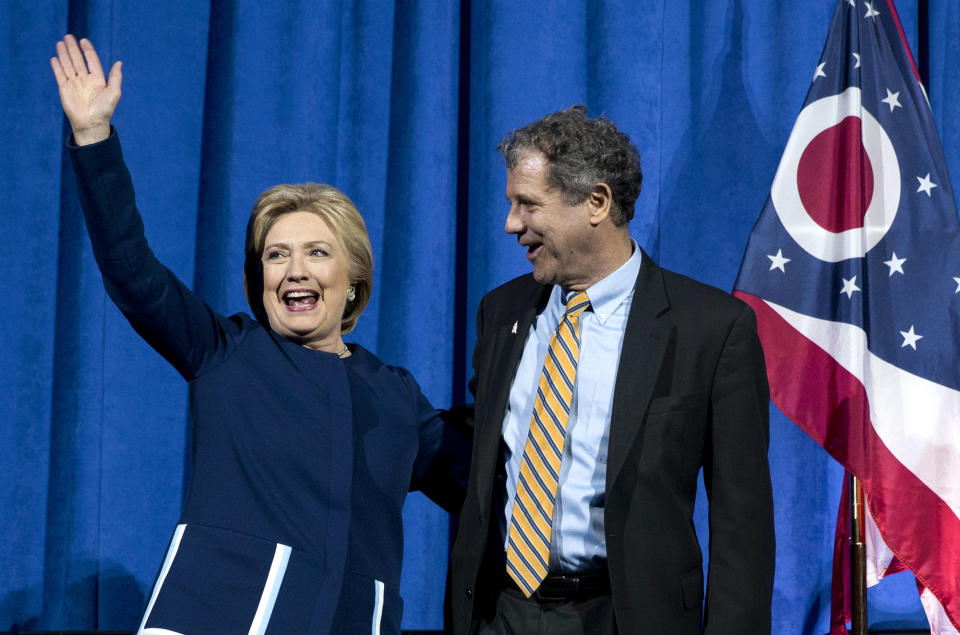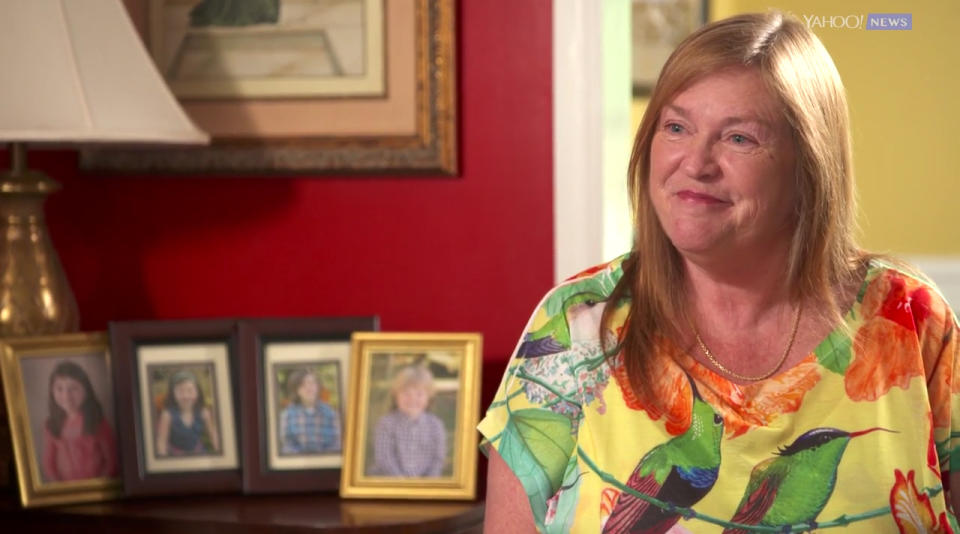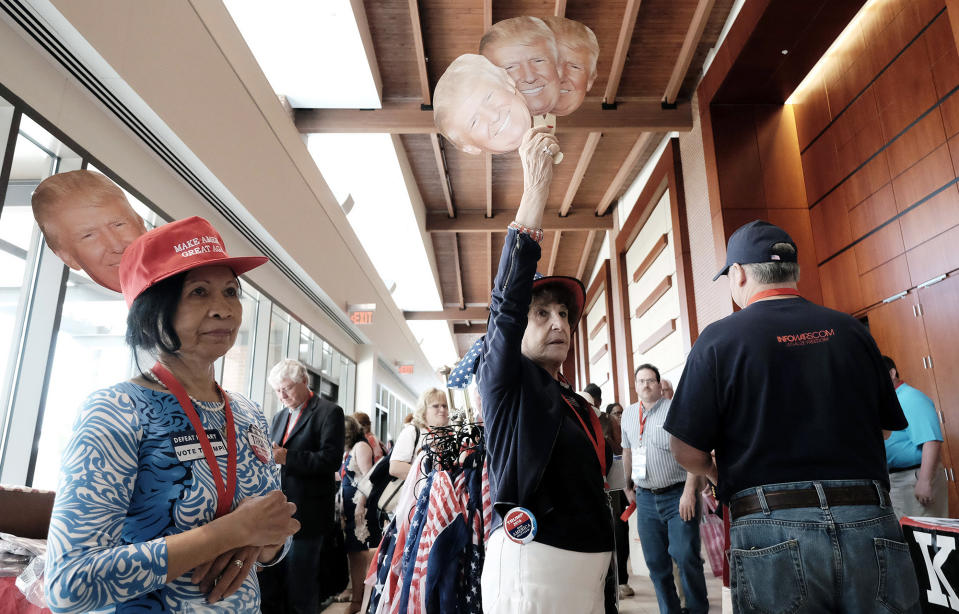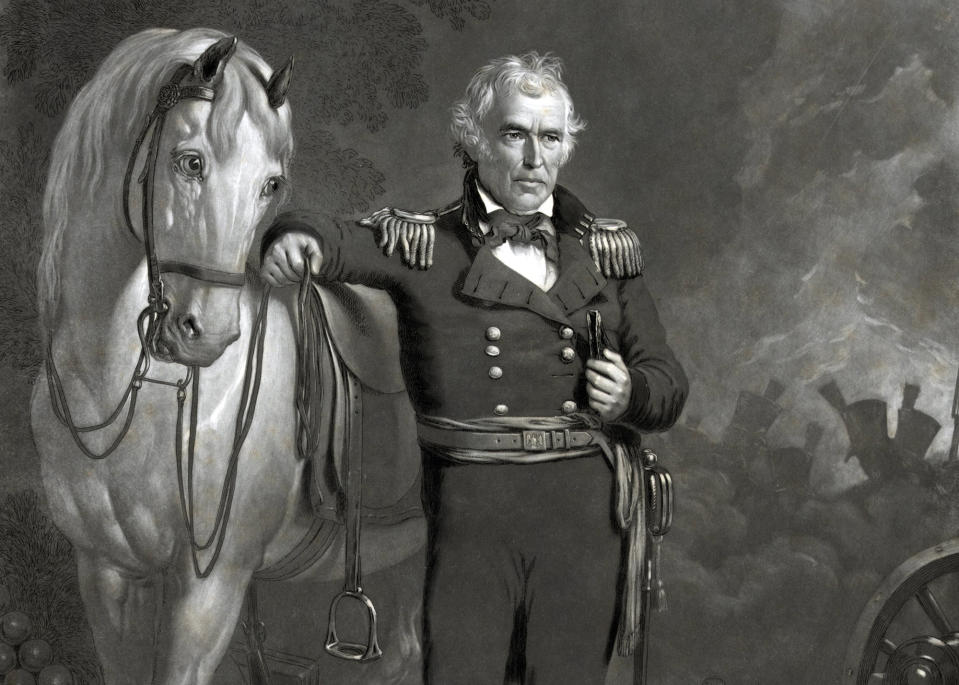Unconventional #22: How a loss in California could make Sherrod Brown Clinton’s perfect VP pick (and more!)
1. The Clinton Veepwatch, Vol. 5: Sherrod Brown
In which Unconventional examines the likely Democratic nominee’s possible — and not-so-possible — vice presidential picks. Previous installments: Elizabeth Warren, Tim Kaine, Mark Cuban, Julián Castro.
Name: Sherrod Campbell Brown
Age: 63
Résumé: U.S. senator from Ohio; former U.S. congressman from Ohio’s 13th District, Ohio secretary of state, and member of the Ohio House of Representatives
Source of speculation: The Great Mentioner has been mentioning the rumpled, froggy voiced Brown as a possible Clinton running mate for a while. But with the publication Sunday of a career-spanning 3,000-word profile in USA Today — and many other Gannett papers — the buzz about Brown is getting louder.
“A partisan brawler who’s as obsessed with baseball as he is with politics, Brown is Ohio’s senior senator and — perhaps — the next Democratic nominee for vice president of the United States,” writes Gannett Washington Correspondent Deirdre Shesgreen. “With his unabashed progressive politics suddenly in vogue and his home state of Ohio a pivotal presidential battleground, Brown is among Democrats being touted for the No. 2 slot on a Clinton ticket.”
Shesgreen goes on to say that, according to his supporters, “Brown would be a great pick — a salt-of-the-earth candidate whose mix of progressive politics and Midwestern pragmatism could appeal to a broad swath of voters.”
Then she quotes two of the most prominent Democrats in the country all but endorsing the idea of a Clinton-Brown ticket.
“He was a populist before being populist was cool,” says Missouri Sen. Claire McCaskill.
“He’d be a great choice,” adds Joe Biden — who happens to know a little something about the job.
Expect more stories like Shesgreen’s to pop up in the press as the Democratic nominating contest draws to a close next Tuesday in Washington, D.C. — and as Clinton begins to turn her attention toward picking a second-in-command.

Backstory: Beltway types were chattering about Brown’s veep chances before Clinton even announced her candidacy. In a January 2015 Washington Post profile, Ben Terris asked why “progressives” weren’t “begging [Brown] to run for president” — then touted the senator as a smart pick for Hillary’s (hypothetical) ticket instead.
“If Clinton gets the nomination and wants to allay the [Elizabeth] Warren wing of the party, maybe she can pick the progressive senator from a state she will need to win?” Terris speculated.
The notion continued to pick up steam once the 2016 campaign got underway.
In October 2015, Brown surprised many observers by endorsing Clinton over left-wing kindred spirit Bernie Sanders, who was trailing the former secretary of state by 40 percentage points in the polls at the time. “From opposing unfair trade deals to fighting for a fair financial system, Hillary Clinton has shown she puts working families first,” Brown said in a statement. “She knows as president that her first job will be creating jobs for the middle class.”
The somewhat uncharacteristic move — Brown refused to endorse either Obama or Clinton during the heat of the 2008 Democratic primary — prompted another round of speculation about his VP prospects.
“Some liberals have floated Brown as a possible vice presidential pick,” wrote MSNBC’s Alex Seitz-Wald, “noting he could help deliver votes in Ohio, perhaps the single most important general election swing state.”
But Brown’s stock really began to rise after Donald Trump emerged in March as the likely Republican nominee. The Clinton camp (and Bill Clinton in particular) long assumed that Hillary would be facing off against Florida Sen. Marco Rubio in November. In that scenario, picking a running mate like, say, Julián Castro could help keep Latino voters from defecting to the GOP. That’s no longer necessary, however, with a man who calls Mexican immigrants “rapists” atop the GOP ticket. Instead, Clinton is now more concerned with losing white working-class voters from Rust Belt states like Ohio, Michigan, Pennsylvania, and Wisconsin to Trump — and with uniting her own party in the wake of Sanders’ spirited challenge.
As an unapologetic liberal and a union champion, Brown is uniquely suited to both missions — or so the thinking goes.
“With Donald Trump increasingly likely to win the Republican nomination, some Democrats say Clinton needs to consider picking a running mate who can counter his populist appeal,” the Hill wrote in March. “Progressives view [Brown] as in line with Warren on most issues and believe he could help propel Clinton to critical Rust Belt wins in the general election.”
From the beginning, Brown’s answer to the VP question has been the same.
“I have zero interest in being vice president,” Brown told the Washington Post last year.
“I do not want to be vice president,” Brown informed the Hill five months later. “I love working for the people of Ohio, and I have a lot more work to do as their senator.”
But in the new Gannett profile, the senator’s tone seems to have softened. “We like where we live,” Brown says. “We like the life we have.”
“There’s no point in getting worked up about it until I see what happens,” adds Brown’s wife, the journalist Connie Schultz — before admitting that she won’t say no if Clinton comes calling. “I would never dream of stepping in his way. We are very supportive of each other.”
Odds: Depends what happens Tuesday in California.
Although Schultz says that “we have no idea if he’s being vetted at all,” Brown is, according to the New York Times, “among the names under discussion by Mrs. Clinton.”
If Hillary loses the Golden State primary — an outcome that would encourage Sanders to keep battering her from the left all the way to the convention in Philadelphia — Brown could shoot to the top of her shortlist. The most important thing for Clinton at that point would be persuading progressives to trust her and to turn out in November. Tapping Brown would be the quickest way to do it. The fact that he also has some serious anti-Trump assets — Ohio address, blue-collar cred, attack-dog chops — would only heighten his appeal.
If Clinton wins California, however, then all bets are off. In that case, Sanders would probably bow out shortly after the final Democratic primary, in Washington on June 14, and Clinton may start to pivot toward the center. Picking someone like Sen. Mark Warner or Sen. Tim Kaine, both of Virginia, would hit some of the same notes as picking Brown — white, working-class, swing state, and so on — without yanking the ticket to the left just in time for the general.
It would also help Clinton avoid the main drawback of plucking Brown from the Senate: the fact that Ohio’s GOP governor, John Kasich, would almost certainly imperil the Democrats’ potential majority by appointing a Republican to replace him. (Virginia Gov. Terry McAuliffe is a Democrat.)
“If we have a Republican governor in any of those states, the answer is not only no, but hell no,” Senate Majority Leader Harry Reid told MSNBC’s Joy Reid last month when asked about the prospect of Brown (among others) joining Clinton’s ticket. “I would yell and scream to stop that.”
_____
2. Jane Sanders on why the media shouldn’t declare Clinton the nominee before Philadelphia — and what Bernie plans to do if he loses

Yahoo News Chief National Correspondent Lisa Belkin just got back from in Burlington, Vt., where she spent a day hanging out with Bernie Sanders’ wife Jane. They talked about a lot of things: printer cartridges, Don Quixote, Donald Trump. But for our purposes here at Unconventional, the most interesting moments were when Jane talked about Bernie’s endgame — specifically, why the press should wait until the convention before crowning a nominee and what he’s planning to do if he doesn’t win in Philadelphia.
A few key excerpts, starting with Jane on why Clinton’s delegate shouldn’t include superdelegates (yet):
As she waits for a microphone to be clipped to the colorful tropical-bird-themed shirt that she bought on a campaign trip to Puerto Rico ahead of the June 5 primary there, she worries briefly that Wolf Blitzer might actually ask her about gorillas too. But instead most of their conversation is about another topic that frustrates her — the math of the nomination. Can her husband possibly win a large enough percentage of the June 7 vote to overcome Hillary Clinton’s delegate lead?
In response, she takes CNN to task for including superdelegates in their tally.
“I think CNN and MSNBC should listen to the communications director of the DNC when she says don’t count those superdelegates before they vote,” she says. “Yes, he’s 272 pledged delegates behind Secretary Clinton, and it is a steep climb, but the fact is he’s won a number of races, a number of elections, by large margins,” and if he somehow does that well in California, he could lead in the pledged delegate count.
If that’s the case, she argues, superdelegates might change their votes. “It’s tough, but it’s doable,” she insists. “You don’t quit before the final vote is counted.”
The segment ends, but she waits to have an unaired word with Blitzer. “Don’t include those superdelegates and pronounce her the nominee immediately after New Jersey closes” she warns — meaning three hours before voting ends in California on Tuesday. “Don’t count those superdelegates until they actually vote on July 25.”
Jane on why superdelegates exist:
“I knew nothing about the Democratic primary process” at the start of this campaign, she admits, since both she and her husband are both Independents. “It has been a real education. And we need to reform that electoral process, not from a self-centered point of view, but for the future. If it were a self-centered view, we would have been complaining all along, we’re just taking notes.”
Not complaining? I ask. Isn’t all this “don’t count the superdelegates yet” actually complaining?
No, she says. It’s just clarifying the larger existential reason for those delegates in the first place.
“The purpose of the superdelegates is supposedly to make sure the right person gets the nomination,” she says. Her husband disagrees that such a mechanism should exist, and if he were designing the rules they would not, but since they do, she argues, they should be permitted to actually do that job. “They are the insurance policy,” she says. “And our question is: Are they the insurance policy for the establishment candidate or are they the insurance policy for the Democratic Party.”
And Jane on the new group that Bernie will launch after the election:
Back at the wheel, Jane is talking about what happens after November. Her husband does not take his talk of a “revolution” lightly, she says, and win or lose he and his circle intend to use the clout from this campaign to keep pushing their ideas. That means marshaling the lists and infrastructure built during the past year into some sort of organized change.
“It’s not just about winning the presidency, it’s about changing our country to have it be what we all want it to be and know it can be,” she says. “As president, he’d want an outside, really organized group of people helping support him, moving it in the direction of the issues that he’s talked about. And if he’s not the nominee, it will be him leading that group, leading that transformation.”
She’s been spending some time noodling on the details of such a group — something like MoveOn or Organizing for Action, but with a Sanders-issues focus. “It’s something I’ve thought about and will be able to bring to him at a future moment, not in the middle of a campaign. This is something we will move on regardless of the outcome of this election, and I will definitely be involved in that.”
Make sure to read the rest of Belkin’s profile here.
_____
3. Republicans rally around — and rationalize — Trump at state GOP conventions

Remember when each weekend used to bring news of some contentious state GOP convention where activists railed against the prospect of presidential nominee Donald Trump — and where, more often than not, rebel forces loyal to a rival candidate successfully contrived to steal control of the state’s delegation from the guy who actually, you know, won the primary?
Alas. It seems so long ago.
In yet another sign the Republican Party has come to terms with its new ochre-hued leader, four states held their GOP conventions last weekend — Georgia, New Hampshire, Idaho and Oregon — and the headlines that emerged from each event were almost identical:
“The Republican Party calls for uniformity after Georgia Republican Convention”
“NH Republican convention rallies behind Trump”
“Idaho GOP concludes businesslike state convention with show of unity”
“Oregon GOP rally behind Trump as only choice”
The last one nicely captures the flavor of these affairs: resignation, rationalization and rah-rah rhetoric from Republicans who recognize they’ve run out of other options.
“Initially I was a Cruz guy,” former Deschutes County Republican Chairman John Philo told Central Oregon’s The Bulletin. “But we’ve got to unify.”
“You don’t see any fighting between supporters of the campaigns,” added state Rep. Gene Whisnant. “I haven’t heard anyone say, ‘I am not going to vote for Trump.’”
Trump came away from the Oregon convention with all 18 of the delegates he’d earned in the state’s May 17 primary — but not all them were selected because of their undying love for the Donald. State Republican Party Treasurer Chris Barreto, a former Cruz supporter, ran to protect the GOP platform in Cleveland. Meanwhile, state Rep. Bill Post, another Cruz convert, was mainly hoping to attract money for local legislative races.
“I’m more concerned about Oregon,” Post said. “That’s always been my concern.”
Ultimately, nine of Oregon’s 10 at-large delegates were elected from a unity slate endorsed by both the Trump and Cruz campaigns.
The story was much the same in New Hampshire and Idaho. According to the Associated Press, “no one at the [Granite State] meeting publicly criticized Trump or suggested Republicans shouldn’t back him.” Republicans in the Gem State also “got the memo,” according to Idaho Statesman reporter Bill Dentzer, “embrac[ing] the national party message of unity against a common foe — the Democrats.”
“Everyone is focused on November and making sure we beat Hillary Clinton,” said state Rep. Brent Crane.
Only in Georgia did any Republicans revolt. Back in April, Cruz allies outmaneuvered Trump by winning a majority of the 42 delegates up for grabs at the district conventions, and they tried to pull off a similar feat Saturday by challenging the state GOP’s final Trump-friendly slate with their own list of 31 potential delegates (most of whom were pro-Cruz). But when it came time for a vote, the last-minute scheme fell short — and all of Cruz’s supporters were “soundly defeated.”
“This is our nominee,” newly minted delegate Michael McNeely said of Trump. “We’re going to come together and face off with the Democrats in November.”
The question now is whether this pattern will continue through Cleveland — or whether Trump will do something to upset the GOP’s fragile new unity before then. The big convention is 41 days away. We wouldn’t put it past him.
_____
4. Why did Paul Ryan endorse Trump?
Last week, House Speaker and GOP Convention Chairman Paul Ryan finally signaled that he would be supporting Trump in the fall. But why, if the two men disagree on so many issues, did Ryan give in? Yahoo News Senior Political Correspondent Jon Ward has a theory — to protect the reform agenda he plans to start rolling out this week and avoid any blame if and when Trump loses in November:
Many conservatives sympathetic to Ryan believe that Trump’s assurances are worthless, because Trump has repeatedly shown a tendency to backtrack on his own statements. Ryan boosters expressed bafflement over the timing of this week’s Trump endorsement, but some said they thought he was likely trying to protect his six-point reform agenda from Trump criticism as the speaker unveils each piece over the next three weeks.
“Our goal is to spend this summer and this fall talking with our fellow citizens about these ideas, about these principles, about these policies,” Ryan said.
If Ryan is attempting to insulate his policy agenda and tie Trump to it, then his endorsement of Trump was also a concession to political pressures. Ryan does not want to be blamed in any way for a Trump loss, because it would give oxygen to the forces that have created him. Many political insiders of both parties see Trump as a fool or dangerous, or both, and Republicans who hope or expect him to fail are mostly trying to get out of his way so that they can pick up the pieces after he loses the election this fall to Clinton.
And so, despite Ryan’s endorsement of Trump, he will also likely do as little as possible to support his candidacy. A Ryan aide told Yahoo News that he would not be encouraging other Republicans one way or another on whether to support Trump.
Ryan “was speaking for himself,” the aide said of the speaker’s Thursday op-ed, in which he said he would vote for Trump. “This is a decision individuals will make on their own.”
So it wasn’t just about awkwardness in Cleveland! Sounds about right to us. But what do you think? Drop us a line on Twitter (@andrewromano) and we’ll retweet the smartest responses.
_____

5. Best of the Rest
After much thought and prayer: I’m Not Running for President https://t.co/lqWQtPL5Q5
— David French (@DavidAFrench) June 6, 2016
Splits evident in @berniesanders campaign over how far to push his fight, whether to take it all way to convention https://t.co/5yU7hhVEAF
— Peter Nicholas (@PeterWSJ) June 6, 2016
Hillary Clinton wins Puerto Rico's primary, putting her within striking distance of capturing her party's nomination https://t.co/BsVICsMtuz
— Lisa Lerer (@llerer) June 6, 2016
UPDATED: @BernieSanders vows fight to convention as @HillaryClinton wins PR primary & is 28 delegates away from win https://t.co/tw4d6WCOyv
— Yamiche Alcindor (@Yamiche) June 6, 2016
4 fairly disconnected thoughts on California polls, demographics, early voting, and the election night vote count https://t.co/XfwJVqiQ8F
— Nate Cohn (@Nate_Cohn) June 6, 2016
The RNC is huddling with industry lobbyists in an effort to craft a cohesive policy platform – https://t.co/L7xuKHIe1L
— Andrew Restuccia (@AndrewRestuccia) June 4, 2016
And the story — Warren: 'I don't believe in superdelegates'
https://t.co/Oml3ZSZpd2 via @politicoMA— Lauren Dezenski (@LaurenDezenski) June 4, 2016
Libertarian @GovGaryJohnson is targeting anti-Hillary Bernie voters-but Trump's border plan is his true target https://t.co/0OUjzFR1Sa
— Glenn Thrush (@GlennThrush) June 6, 2016
_____
History Lesson

In June 1848, when they gathered for their convention at the Chinese Museum Building in Philadelphia, the Whigs had a choice. They could nominate a party stalwart like Henry Clay or Daniel Webster. They could select antislavery Gen. Winfield Scott. Or they could go with an inexperienced, loutish, wealthy outsider who had never held office or voted in a presidential election, and who professed little loyalty to Whig principles, but who nonetheless had become a nationwide celebrity after winning the Mexican-American War: General Zachary Taylor.
It wasn’t an easy decision. The Whig Party was divided between antislavery Northerners and Southern slaveholders, and no candidate managed to win a majority on the first three ballots. Finally, on the fourth, Taylor — the rough-hewn outsider — captured the nomination.
His victory was a triumph of popularity over party loyalty and principles — and, as historian Gil Troy recounts, it basically killed the Whigs.
“Some party luminaries thought [Taylor] would help them win the general election, but many of the faithful were furious and mystified: How could their party compromise its ideals to such a degree?” Troy writes. “The Whig Party never recovered from his victory. In fact, just a few years after Taylor was elected under the Whig banner, the party dissolved — undermined by the divisions that caused Taylor’s nomination in the first place, and also by the loss of faith that followed it.”
Something for Republicans to consider at their own convention this summer in Cleveland.
_____
Countdown
For the latest data, make sure to check the Yahoo News delegate scorecard and primary calendar.



